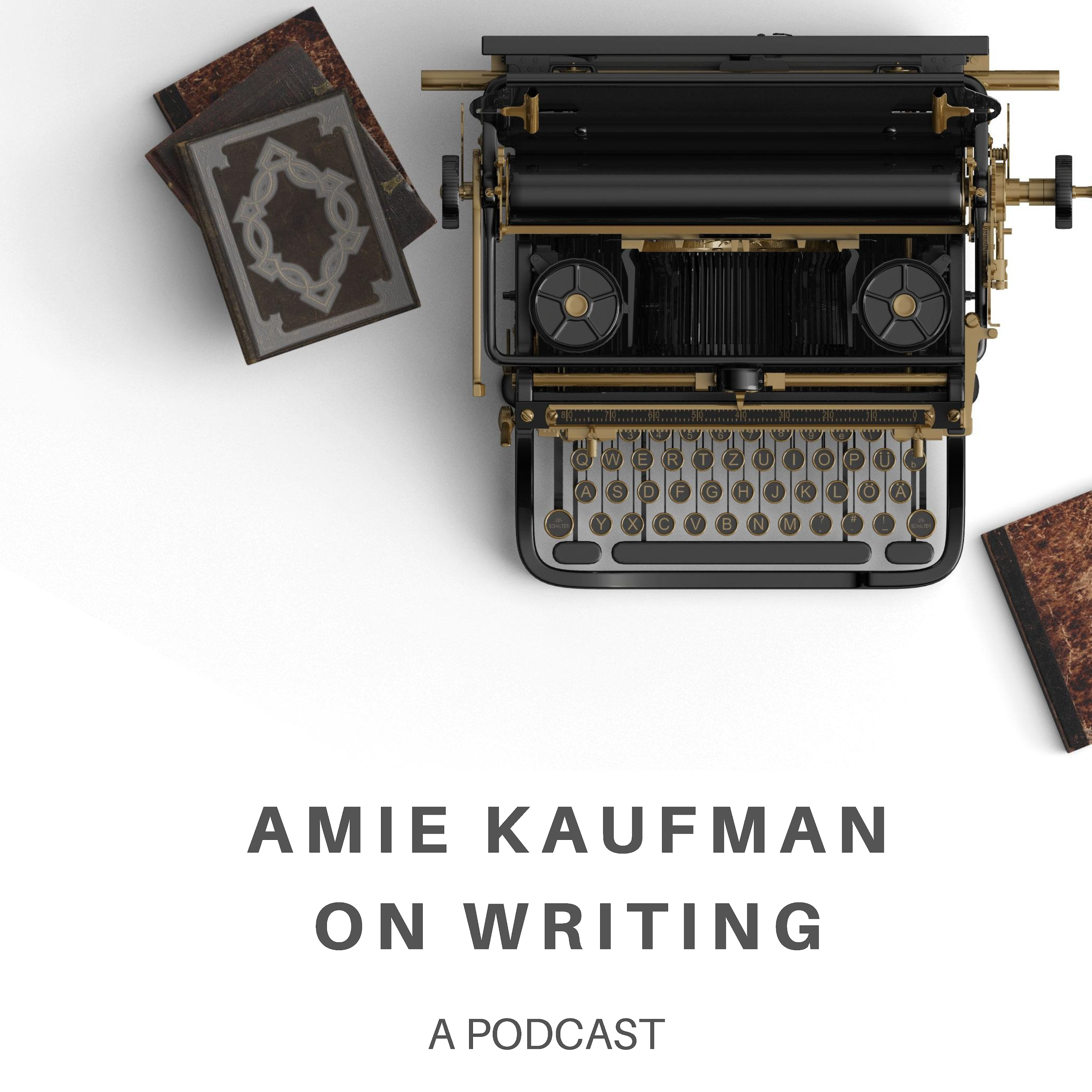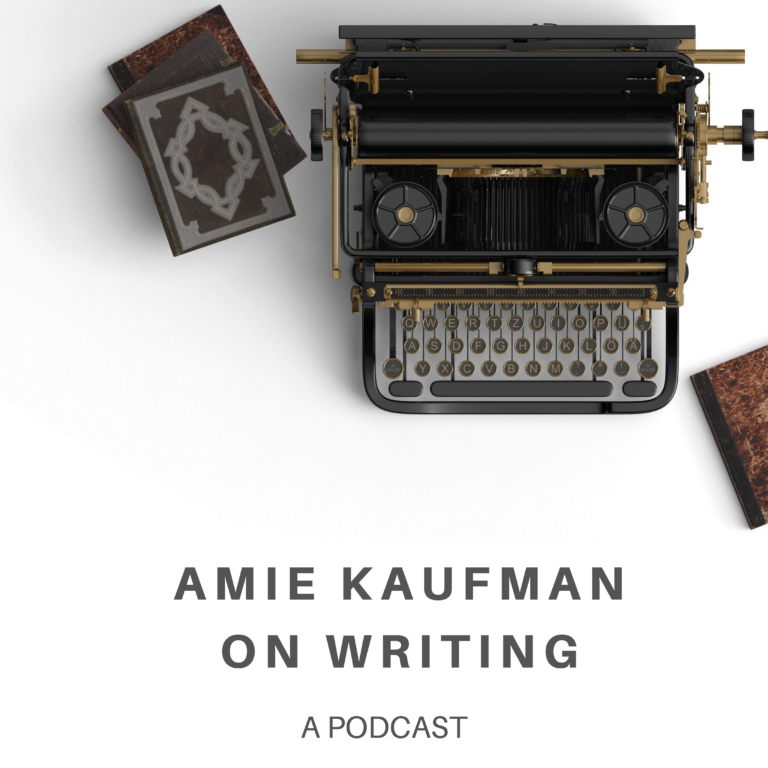Episode 9: How To Get That Draft Finished

New York Times and internationally bestselling author Amie Kaufman answers one question each week about writing craft. Full of practical tips and an exercise each week, this is a show for writers, for readers who want a backstage look at how their favourite authors craft their stories, or for creative writing classrooms.
You can find a transcript of this episode at my website, where you can also subscribe to my newsletter, get behind-the-scenes peeks at how I write, and any other news about new books, events or the podcast. You can also submit a question for the podcast on my website. You can find me on Twitter or Instagram.

FOLLOW ON APPLE PODCASTS . FOLLOW ON SPOTIFY . FOLLOW ON OVERCAST . FOLLOW ON PODCAST ADDICT
Season 2, Episode 9: How To Get That Draft Finished
Hi, my friends.
Welcome to Amie Kaufman on Writing, a short podcast that answers one question each week about how writers do what they do.
If you’re a writer, or you’re a reader interested in how your favourite authors craft their stories, then you’re in the right place.
This is Season 2, Episode 9: How To Get That Draft Finished
Here’s my friend and producer Kate with this week’s question. Hi Kate, how are you?
Hi Amie, I’m good!
This week’s question is from Pavi, who says: Please, please tell me your secrets for finishing a story. I just can’t seem to get to the finish line, and you’ve done it fifteen times. Tell me your secrets!
Ha, thanks Pavi! I don’t mean this in a depressing way, but it honestly never gets easy. It’s work to finish a book, no matter how many times you do it. But that said, the good news is that over time you do develop a toolbox you can turn to when the going gets tough.
And I’m going to let you in on a secret: If you do finish your story, it will be better than 95% of stories ever written, because it will actually have an ending. So let’s talk about how to do it.
In last week’s episode, I talked about what to do when you fall out of love with your story—which is, of course, a big reason that people don’t finish their story. It’s not the only reason, though. Today I’m going to give you three things to try if you know you love your story, but you still need help finishing.
Tip number one: Think about outlining either more, or less. Now, I know this sounds contradictory, but bear with me. In writing, we often talk about plotters and pantsers. Plotters like to plot out each part of the story before they begin. Pantsers like to write by the seat of their pants—they sit down and write ‘once upon a time’ and see where they end up.
Now, most people actually end up somewhere on the spectrum between the two, and if you’re finding it tough to finish, it might be worth seeing what happens if you slide one way or another along the scale.
If you usually don’t outline, perhaps pull out an outlining tool—a great place to start is Jessica Brody’s book Save The Cat Writes A Novel, which I know she also has available as part of her Writing Mastery Academy—and please let me also say that that’s not a sponsored mention, just a recommendation. You might find that using a framework will help you figure out where to go next, and that gets the story moving again.
Alternately, sometimes writers who plot too much find they’ve taken away a little bit of the joy of discovery for themselves. Perhaps you could try some unplanned writing—it could be advancing your story, or it could be writing some backstory or vignettes about your characters. Just something to give yourself the feeling of movement.
So, tip one is to plot more, or plot less—depending on who you are!
Tip two is to make sure that you have writing time. It seems to be the day for mentioning other writers, because I’m also going to mention Greg McKeown, who wrote a book called Essentialism. He talks about the idea that when something is essential in your life, you should make it something that happens by default, rather than relying on your willpower every day.
For me, that means scheduling in advance when I’m going to write—whether you do that by carving out a little time first thing in the morning, late at night, in your lunch hour, or every Sunday afternoon, having a time when you know in advance you’re going to write means you don’t have to think of it, then summon the willpower to do it every time. It’s like booking yourself in to go to the gym ahead of time—you show up because you made a plan.
Tip three is also about planning time to write, but in a different way—perhaps the way to finish your novel is to try something like NaNoWriMo. It’s how I wrote my first novel. NaNoWriMo is National Novel Writing Month, and happens every year in November—their motto is “thirty days and thirty nights of literary madness” and the idea is that you throw sanity to the wind, and just wear your pjs and drink too much caffeine and go, go, go until you’ve written fifty thousand words. It’s been so successful that the NaNo team now has other programs in other months of the year as well.
Now, NaNoWriMo might be too much for you, or you just might not have a lifestyle that allows for it—but the principle stands. Perhaps you could work with your family to carve out a whole weekend, or make some other plan to get some momentum. It’s about treating your writing like it’s important, so that you know in your mind and your heart that it really is—that will help you justify spending the time on it. Because trust me: your writing is important.
Ultimately—and this is the tough love part of my advice—nobody can finish your novel for you. It’s up to you. I absolutely know how hard it can be—I wrote my first novels while working full time, numb with exhaustion from far too many late nights. Life comes in seasons, and some of them are much easier to write through than others—if you want or need to take a break, that’s okay. But if it’s time to finish your story, then the only way it’s going to happen is to get your shapely behind in that chair, and your hands on the keyboard. That’s what writers currently call BICHOK – it’s the only way to get through your draft, and it stands for “butt in chair, hands on keyboard.”
So, there you have three tips for getting that novel finished:
One, try outlining a little more, or a little less.
Two, schedule your time so you write by default, rather than relying on willpower.
Three, try NaNoWriMo, or a dedicated period of time for writing.
Here’s an exercise: Whether you’re a reader or a writer, this one’s still going to be good for you. Some time in the next twenty-four hours after you’ve listened to this episode, find yourself ten minutes and sit down to start writing. Put your phone out of reach. Turn off the internet. Set a timer, and just go, go, go. It’ll do you good.
Now, usually this is where we wrap up, but because it’s the last episode of the month, I’m sticking around a couple of minutes longer to give you a book recommendation. This month, I want to tell you about The Deceivers by Kristen Simmons.
As always, these book recommendations aren’t sponsored or influenced by anyone in any way—they’re just books I love that you might not have picked up, that demonstrate great writing, and make great reads.
The Deceivers is the first in a trilogy—and all three books have been published, so when you love it, you’ll be able to jump straight into the sequels. It demonstrates so many of the things we’ve talked about in these episodes, from weaving in backstory to writing morally ambiguous characters to crafting killer chapter endings.
The Deceivers is a fast, pacey book about a girl called Brynn who’s offered a place at an elite boarding school—a chance to leave her past and all her troubles behind.
Then Brynn finds out why she was offered that place. See, until now she’s been undertaking a different kind of education, scamming rich kids in a Robin Hood kind of way—except she’s the poor one, so, she holds onto the cash.
Vale Hall is a school for con artists, and when you arrive in a place where everyone’s a liar, you need to be careful about believing them when they tell you why you’re there.
Kristen Simmons is such a talented author, with lots of titles to her name, and this is a great place to dive into her work. I think you’ll love it, and there’s a lot to learn from the way she puts the story together.
And that’s our book rec! Next week is our final episode of season two—that came around quickly—and I’ll be answering a question about unreliable narrators. Or will I? No, I will. You can trust me.
In the meantime, I’ll remind you to subscribe, and leave the podcast a review wherever you listen. Both these things help new listeners find the podcast, and I really appreciate it.
You can find me at my website, which is at amiekaufman.com – you can subscribe to my newsletter there, for behind-the-scenes peeks at how I write, and any other news about new books, events or the podcast. You can also submit a question for the podcast on my website. You can find me on Instagram at @AmieKaufmanAuthor or on twitter at @AmieKaufman. This podcast is produced by the lovely Kate Armstrong, host of one of my favourite podcasts, The Exploress, which time travels through women’s history one era at a time. You can find her at theexploresspodcast.com.
For now, thanks so much for listening – enjoy your reading, and enjoy your writing.
Have a Question?
You can submit your question using the form using the form on the main podcast page — if you’re stuck on one aspect of your work, or you’re wondering how your favourite author pulled something off, we’d love to hear from you!

